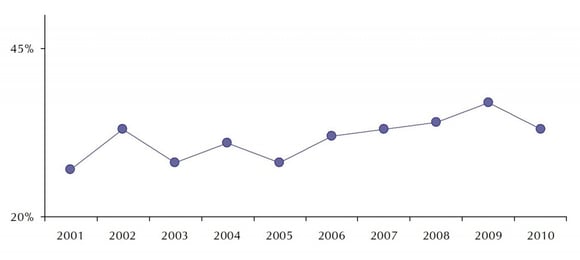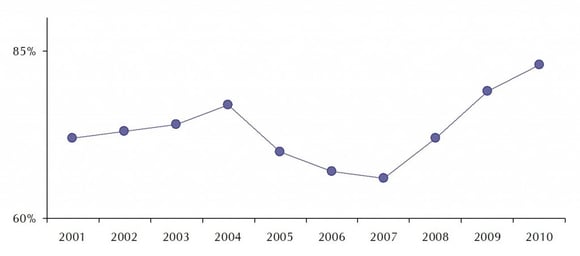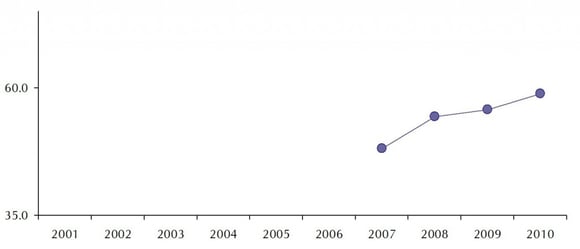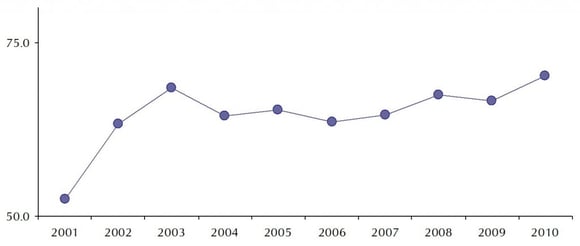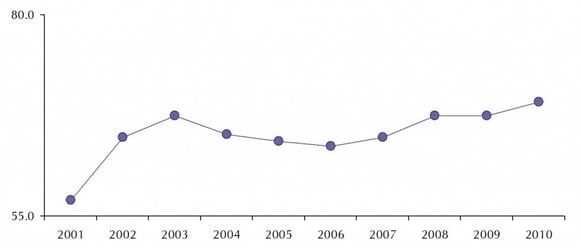The Hurt Dividend
By NRC on January 13, 2015

This article originally appeared in ICMA Muni Yearbook 2011 v 78 The Hurt Dividend: Residents' Appreciation for Local Government Services in Tough Times (e-Document) by Thomas I Miller, President and Shannon E. Hayden, Senior Research Associate
If you enjoyed the last week of 2010, you probably were in Papua New Guinea where you only had spotty Web connection and cannibals to contend with. Those local government managers who stayed at home to enjoy the plenty of 2010 ushered in 2011 with headlines like these:
“Indiana Bill Outlines Bankruptcy Procedure For Municipal Governments”
“Dutchess County, New York, To Consolidate Departments”
“El Paso, Texas, City Manager Refutes "Huge Shortage" Of Police Officers”
“Winnebago County, Illinois, Sherriff Gets By On A Reduced Budget”
“Wall Street Analyst: Many US Cities May Default”
Word on the street is that this country’s future holidays will be brighter than the last couple, now that the tax compromise has become law, consumer spending is noticeably improved and the stock market is returning household wealth that investors saw spin down the rabbit hole in late 2008. Don’t blame yourself if you don’t yet see the turn-around because most pundits argue that government will remain sickly for months after the private sector has revitalized. What could be worse than the economic tornado that swept away, well, street sweeping, along with public safety personnel, library hours, the foliage in our street medians and the lights on our streets? What could do more damage to the reputation of our hard work and the good will of our residents either to deny services long expected or to charge more for even less service than before?
Here’s what could be worse. You’re struck by lightning and no one notices. All the great services in your jurisdiction could be ravaged by the economic macro-burst and residents don’t care. Many would think, some would hope, that the attitudes of residents denied snow removal, code inspection, road repair, jobs and economic development would be as depressed as the housing and consumer markets that first impelled the service cuts. It is expected that the country’s fall from the economic cliff would be noticed by those who received local government services fuelled by revenue when times were good.
National Research Center, Inc. (NRC) principals have been leading innovation in citizen survey methods and reporting since 1990 and we have conducted more than 1,000 surveys about resident perspectives since 1995. In 2001 NRC partnered with ICMA to offer The National Citizen Survey™ to local governments. Because we meticulously tend the database of those nine years of responses to core questions asked of a representative sample of residents in hundreds of locales from Honolulu to Montpelier, we have grown a hardy repository of opinions of over 180,000 residents. Residents’ perspectives about scores of local government services and many characteristics of community quality allow us (and others) to reflect on current trends in resident opinions and to discover what, so far, has happened as the world’s wealth – and the wealth of individual communities – has tottered and lurched.
Over time, we have created tests of wording and method, and sometimes found ourselves with an opportunity to analyze the impacts of naturally occurring phenomena (Were there differences in resident perspectives in surveys received just before versus just after 9/11? No. Does a once in one hundred year snow storm shake residents’ confidence in their local government snow removal service? Yes. Can residents return to feeling safe even after a sniper terrorizes their city? Yes.)
So the fall 2008 financial meltdown and subsequent world economic crisis offered NRC the opportunity for another natural experiment. NRC researchers examined how residents reacted to the strong economic decline and found by comparing results across several years of data – as expected – solid empirical evidence that the bad times were not being ignored. Although the set of jurisdictions surveying in each year is not identical (some survey every year and most every other year) and do not represent a random subset of all U.S. cities and counties, the volume of data in each year (from a couple thousand residents in the first year reported to over 15,000 residents in each subsequent year) and the nature of broadly similar experiences of communities across the country during this time, make these results compelling.
When asked to speculate about the likely impact of the economy on their own household’s financial well-being in the upcoming months, we found a slow but steady leading indicator of worsening worry that started in 2006 but spiked in 2009, the year following the worst quarter of stock market losses in generations. By August of 2010, when the data for this report were analyzed, pessimism was abating but economic doubts about the future remained about as negative as in the time leading up to the start of the recession.
Q: What impact, if any, do you think the economy will have on your household income in the next 6 months? (percent of respondents anticipating a negative impact – an indicator of resident pessimism)
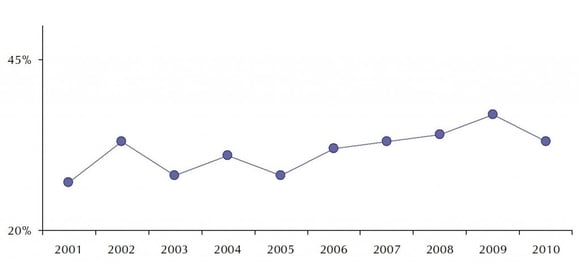
Another expected finding related to residents’ sentiments about population growth. While “growth” was virtually an expletive that majorities in communities wanted deleted for many years, as the economy worsened in 2008 (but even beginning in 2006), residents became less worried about their communities growing too fast. The timing of the downgrading of worry about speedy population growth (2006) mimicked the rise in pessimism about personal economic futures.
Population growth (percent of respondents assessing population growth as too fast)
At the same time, the ever-present worry over too few jobs exacerbated.
Jobs growth (percent of respondents assessing jobs growth as too slow)
Considering the noticeable and predictable disquiet of residents during this period, NRC researchers and our clients wondered if personal concerns about the economy might spread to an overall negative view of community and service. After all, a sour mood is hard to shake even when a friend offers a cookie. This point of view may be considered the “pervasive pain” suspicion. It assumes that the economic cloud that shadows our own homes and jobs attenuates the entire landscape of local government services, pulling service quality sentiment and thoughts about the community into the dark.
It also is possible that community and service ratings would decline over this period if the quality of community and service delivery worsened as budgets had to be trimmed or eviscerated. If opinions get worse because services are cut, we might call this the “poverty penalty,” a cut assessed to quality ratings concomitant with services that are not delivered at former high levels because of revenue short falls.
All this common sense speculation about why service ratings might be expected to decline when cupboards go bare, turned out to be wrong. Across the thousands of residents and hundreds of jurisdictions in our database, we found over these troubled times, that residents’ dismal personal economic forecast was not predictive of their feelings about their community. Nor do residents report having found real service delivery wanting from their local government, at least not yet. While portents of a difficult personal economic future have not fully abated and while worries about flagging job growth deepen, residents currently either are holding steady their opinions of community and service delivery or giving even higher ratings than in better times past.
One dividend of the economic downturn has affected resident views of the availability of affordable housing. A hardship to many who have lost homes, the price declines of housing across the country has meant, for others, homes that are more affordable. Resident opinions make clear that the opportunity presented in lower cost housing has been noticed.
Availability of affordable quality housing ({7d2d4cb14c544bbeb3cd4763dc2b1aa4e79f5bb51403ad6dac1e84ac9d980b0d} excellent and {7d2d4cb14c544bbeb3cd4763dc2b1aa4e79f5bb51403ad6dac1e84ac9d980b0d} good)
This improved rating of affordable housing is a sad benefit of a market collapse, but cost of housing, like declining ratings of personal economic futures or worries about job growth still represents a direct measure of resident sentiment about the economy. What about general ratings of community quality or service delivery that are not proxies for economic conditions? Here is where the surprise comes in.
Ratings of the overall quality of life have held steady with partial results from 2010 showing a possible uptick.
The overall quality of life in your community
The same trend appears in answers to questions about the quality of neighborhood or city as a place to live or retire. Despite the economic storm, residents still see good in where they live. Could these be signs of gratitude for the stability that community offers in tough times?
But even if we see stability or improvement of community ratings, what about ratings of local government services? Here, too, we find an unexpected dividend of the bad economy – something we’ll call the “hurt dividend,” an appreciation for local government services in distressed times.
For example, police service ratings hit an all time high.
Police services ({7d2d4cb14c544bbeb3cd4763dc2b1aa4e79f5bb51403ad6dac1e84ac9d980b0d} excellent and {7d2d4cb14c544bbeb3cd4763dc2b1aa4e79f5bb51403ad6dac1e84ac9d980b0d} good)
Fire and EMS showed the same trend. So did opinions about street repair. In fact virtually all examined services – trash haul, code enforcement, parks and recreation, library and services overall – at least had held steady in resident opinion over the two years following the economic crisis. Hypotheses to explain the hurt dividend, that unanticipated buoyancy of resident opinion, abound but without compelling proof.
- Have local governments tried harder – and succeeded – to provide top quality services when the going got tough?
- Has the press painted such a gloomy picture that residents expected worse? Have the real problems in places depicted in the news made people in communities with less economic hardship more grateful? Have cuts been more strategic – excising much more fat than muscle – compared to what the press led residents to believe was required?
- Do residents in jurisdictions that are so transparent as to ask for feedback and guidance in citizen surveys feel more gratitude about services in general?
- Will the real impact of service cuts only begin to be felt in 2011 and beyond?
- Are residents acknowledging that local governments deserve praise when government tries harder despite the turn of the screws?
As the puzzle presented by these results is contemplated, it is important to remember that the broadest cross-section of residents represented in well conducted citizen surveys don’t sound like the ardent nags who lope into public meetings every Tuesday night. Most residents in most communities across America are pleased with the communities in which they live and with the services provided by their local government. That sentiment of general approval has sustained through this deep recession (so far) may say as much about real service delivery as it does about expectations and community engagement.
Local government managers should read several opportunities into these findings:
- If resident opinion about community and local government services remains strong because residents are especially grateful for extraordinary effort when things get tough, then seek to harness that community good will by offering more opportunities for residents to participate in local governance and community service.
- If residents are pleased that good work continues through cutbacks caused by lean times, keep running lean and let residents know even when the economy rebounds.
- If the transparency of citizen surveying helps to keep a positive view of local government, keep surveying and use the results to test if the community continues to be supportive as the economy spikes or dips.
NRC researchers will continue to cultivate the growing database of citizen survey opinion to provide answers as they become apparent and in the meantime, managers should cash in on that hurt dividend.
Popular posts
Sign-up for Updates
You May Also Like
These Related Stories
How significance margins are calculated


